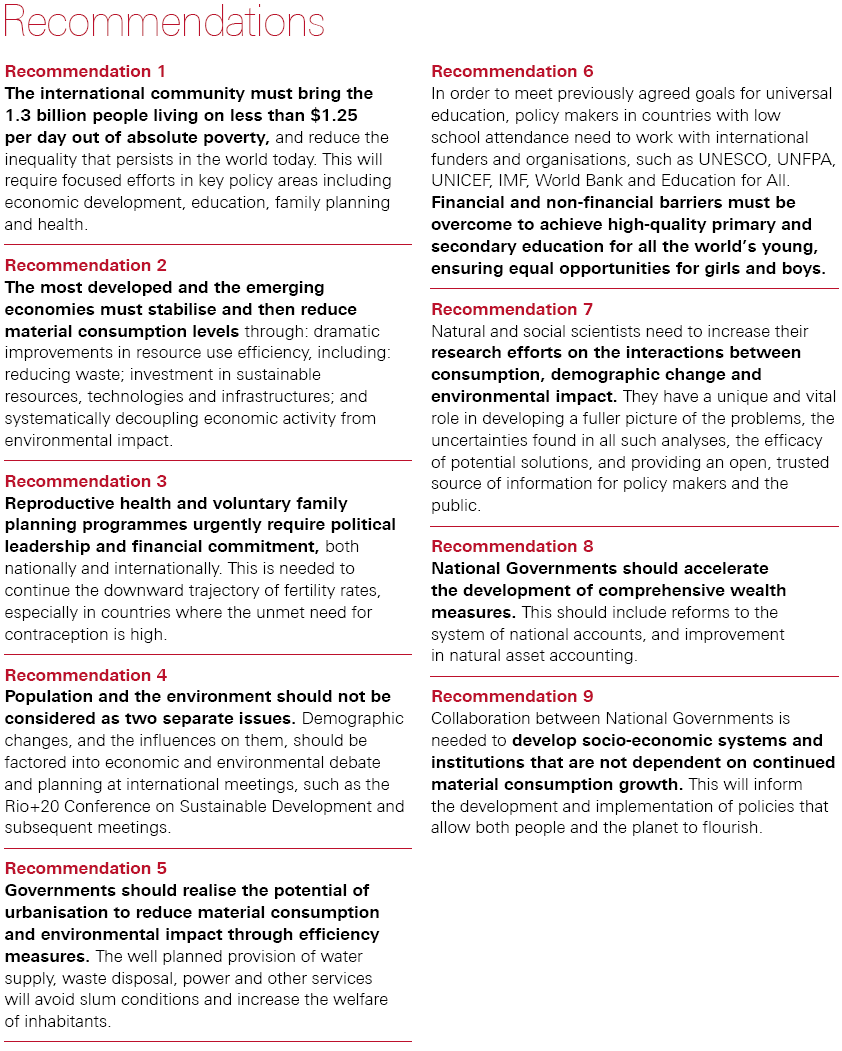|
|
|
|
|
|
|
News & Views item - April 2012 |
![]() The Royal Society's Assessment on the People vs the Planet. (April 28, 2012)
The Royal Society's Assessment on the People vs the Planet. (April 28, 2012)
It's been two-years in gestation but the Royal Society has now released it
134-page report on
People and the Planet![]() .
Or
click here to obtain EPUB or Kindle versions.
.
Or
click here to obtain EPUB or Kindle versions.
In introducing the report Paul Nurse, President of the Royal Society writes:
Rapid and widespread changes in the world’s human population, coupled with
unprecedented levels of consumption present profound challenges to human health
and wellbeing, and the natural environment.
The report is offered... as an overview of the impacts of human population and
consumption on the planet. It raises questions about how best to seize the
opportunities that changes in population could bring – and how to avoid the most
harmful impacts.
We hope this report... will be a springboard for further discussion and action
by national and international Governments, scientific bodies, non-governmental
organisations, the media and many others.
The Working Group chair of the committee responsible for the report is 2002 Nobel Laureate for Physiology or Medicine Sir John Sulston FRS, who is also the current chair of the Institute for Science, Ethics & Innovation, University of Manchester.
Working Group chair Sir John Sulston FRS,
Chair of the Institute for Science, Ethics & Innovation,
University of Manchester gives the rationale for the report.
In addressing the problems of the demographic changes and consumption patterns described in the report the committee considers three pressing challenges as paramount:
First: the world’s 1.3 billion poorest people need to be raised out of extreme poverty. This is critical to reducing global inequality, and to ensuring the wellbeing of all people. It will require increased per capita consumption for this group, allowing improved nutrition and healthcare, and reduction in family size in countries with high fertility rates.
Second: in the most developed and the emerging economies unsustainable consumption must be urgently reduced. This will entail scaling back or radical transformation of damaging material consumption and emissions and the adoption of sustainable technologies, and is critical to ensuring a sustainable future for all. At present, consumption is closely linked to economic models based on growth. Improving the wellbeing of individuals so that humanity flourishes rather than survives requires moving from current economic measures to fully valuing natural capital. Decoupling economic activity from material and environmental throughputs is needed urgently for example by reusing equipment and recycling materials, reducing waste, obtaining energy from renewable sources, and by consumers paying for the wider costs of their consumption. Changes to the current socio-economic model and institutions are needed to allow both people and the planet to flourish by collaboration as well as competition during this and subsequent centuries. This requires farsighted political leadership concentrating on long term goals.
Third: global population growth needs to be slowed and stabilised, but this should by no means be coercive. A large unmet need for contraception remains in both developing and developed countries. Voluntary family planning is a key part of continuing the downward trajectory in fertility rates, which brings benefits to the individual wellbeing of men and women around the world. In the long term a stabilised population is an essential prerequisite for individuals to flourish. Education will play an important role: well educated people tend to live longer healthier lives, are more able to choose the number of children they have and are more resilient to, and capable of, change. Education goals have been repeatedly agreed by the international community, but implementation is poor.
And while the report agrees that "Science and technology have a crucial role to play in meeting these three challenges... [nevertheless] attention must be paid to the socio-economic dimensions of technological deployment, as barriers will not be overcome solely by technology but in combination with changes in usage and governance".
Below are listed the report's nine recommendations.
______________________________________________________________
